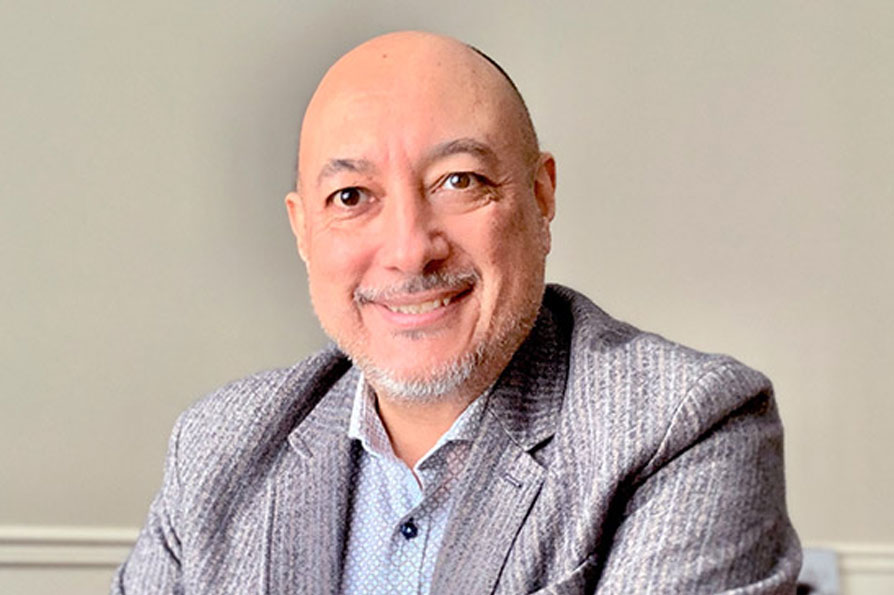WHAT'S HAPPENING AT UNB
ALUMNI NEWS MAGAZINE | Spring/Summer 2021
 With the guidance and support of elders from Indigenous Nations in Canada and abroad, Juan Carlos Rodriguez Camacho is working to improve collaboration and transdisciplinary research between Indigenous and non-Indigenous researchers and communities.
With the guidance and support of elders from Indigenous Nations in Canada and abroad, Juan Carlos Rodriguez Camacho is working to improve collaboration and transdisciplinary research between Indigenous and non-Indigenous researchers and communities.
Dr. Rodriguez, assistant professor at UNB’s Mi’kmaq-Wolastoqey Centre and faculty of education, has developed a multidisciplinary approach to knowledge sharing and research to explore the “togetherness of current challenges.”
Under a community-based approach, Elder Albert Marshall’s Two Eyed-Seeing perspectives and the complex dynamic systems perspectives, Dr. Rodriguez is inviting academics from faculties and departments across UNB, Indigenous and non-Indigenous community members to engage and collaborate in this new dialogue.
This process, referred to as Relatuhedron, is a neologism that emerged from this shared practice. “It represents the need for a place and a process to inspire and promote multilevel, multi-perspective, and multidisciplinary knowledge-action to better understand our complex and constantly evolving societal systems,” says Dr. Rodriguez.
Relatuhedron is rooted in the English word relat from relat-ionship, the Latin hedra, meaning shape and together meaning the “shape of relationships.” Relatuhedron has multiple meanings; as a structure, it can be built by organizing triangles in the shape of a wigwam, a maloca or “ue”, thus honouring the Indigenous homes where social gatherings with relatives and friends are common.
As a place, the Relatuhedron is where sharing knowledge is expressed by art, diagrams, data, values and narratives. Dr. Rodriguez and his team plan on building a Relatuhedron on UNB’s Fredericton campus that will serve as an interactive art installation for visitors and academics alike.
Dr. Rodriguez conceives this approach as a “mangrove tree,” sustaining and protecting rich environments between different kinds of waters and storms. In the Relatuhedron, the systemic-holistic perspective to research and resolve problems results in more flexible and powerful values-based outcomes.
“I am looking to build new opportunities, a machine of possibilities, based on differences and commonalities respecting both Indigenous and Western cultures,” he says, “like effective solutions guided by equality, sharing, collaboration protecting relationships between human-culture and nature.
“It is a space to work revising the systems values of our age, on many dimensions of health and wellbeing, happiness, and productive lives. These are not utopic ‘good things to do,’ but practical and realistic good ways to resolve small everyday problems, learning together how to share and practice our knowledge and shared possibilities.”
The Relatuhedron is also a place to review our understandings and skills on collaborative work. “In a competitive world, there are few opportunities to learn how to collaborate in a supportive way. Competitive attitudes are promoted by the culture as a way to succeed, while collaborative alternatives are less valued. I can see this in all areas of society,” says Dr. Rodriguez.
“Relatuhedron is a place and a mindset where that collaboration can safely be explored. It is a non-judgmental space where the open process of discovering and developing new ways to interconnect and work trans-disciplinarily might flourish. Relatuhedron invites participants to challenge problems and discover their own understanding of what is a practical implication of the intention to collaborate.”
Dr. Rodriguez, who teaches quantitative research analysis, Indigenous perspectives in science, and Indigenous education within UNB’s faculty of education, has fostered an interdisciplinary team at the Mi’kmaq-Wolastoqey Centre that is in the process of researching and developing UNB’s Relatuhedron experience.
The team receives the guidance of Elder Dr. Imelda Perley (BA'94, MEd'02, DLitt'19); Elder Dr. David Perley (MA'08, DLitt'19); Elder Albert Marshall; Natasha Simon (BA'98), director of the Mi’kmaq-Wolastoqey Centre; Dr. Jen Rowett (BScKin'03, MEd'11, PhD'19), counselling and leadership professor in the faculty of education; Andrea Belczewski (BSc'92), senior teaching associate at the Mi’kmaq-Wolastoqey Centre; and Dr. David Danto, program head of psychology at the University of Guelph-Humber.
The team is currently exploring funding research sources to include opportunities for both undergraduate and graduate students at UNB and community members. Dr. Rodriguez aims to develop a course on this practice and share this methodology with teachers on topics of interrelated curriculum, so that they may learn collaborative skills helpful in addressing future challenges within the provincial curriculum.
Dr. Rodriguez is also in the process of finalizing two books on his experiences with the Relatuhedron in Canada and abroad, sharing lessons learned from this methodology. Those works are expected to be shared for publication and release between 2021 to 2022.
This story was originally published on UNB's Research Impact webpage.